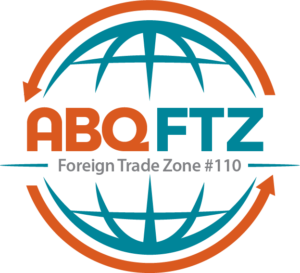BENEFITS OF FOREIGN TRADE ZONE
Cash Savings
- Duties and Tariffs can be eliminated by incorporating an FTZ into your business
- New Mexico Law has provisions for interstate and international furtherance of commerce services to be Gross Receipt Tax Exempt
- Customer’s using NMT’s FTZ can elect to exhibit, check, improve and monitor their commodities in FTZ status to assist in their sales (pre-sales). NMT is a secure facility overseen by U.S. Customs and Border Protection.
- Using rail transportation can save up to 30% opposed to trucking materials
- Green efficiency – rail is a green mode of transportation
Re-Exports and Zone to Zone Transfers
- Commodities that are held in Foreign-Trade Zone’s are held in specially designated zones that are outside the jurisdiction of the United States. The U.S. Department of Commerce approves these zones and Customs and Border Protection oversee the enforcement of laws in these Zones. Federal Commerce laws do not apply in these zones until the material exits the zone for domestic consumption. This means that although FTZ Status materials are physically in the United States, duties and tariffs are not charged to the owner of these materials. This gives an extra edge to businesses to spur domestic production and labor by giving many benefits directly to the local businesses.
- Should a customer elect to remove their commodity from the FTZ and back to its country of origin e.g. the customer did not sell said commodity, they can “re-export” their commodity back to its country without payment of duties or tariffs.
- NMT can act as a forward staging facility holding customer’s commodities, in the event 60% enters the U.S. Commerce and 40% is exported to another country, using an FTZ the savings on duties and tariffs on the 40% will not be charged.
- Moving material from one FTZ to another FTZ is possible. Zone to Zone movement does not constitute an “import” and would still be moved without paying a duty or tariff.
Fees and Cycles
- Without the use of an FTZ, customers pay their harbor maintenance and duties per shipment, by incorporating an FTZ these fees are charged to the customer on a weekly basis versus daily resulting in significant savings.
- By U.S. Department of Commerce (Federal) Laws, tangible property produced in the United States and held in FTZ status would not be subject to state and local ad valorem taxation.
- Should the borders and ports be shut down, commodities destined to Foreign-Trade Zones are allowed into the country first. FTZ’s allow importers to expedite their shipments as the Department of Homeland Security checks will be completed at the Zone.
- If a commodity does not meet U.S. requirements e.g. Owner’s manual on finished product is missing. Instead of shipping back to the factory location the shipment may be sent to an FTZ to manipulate the product to meet importation requirements. NMT has contract staff on hand to assist.
 Click to learn why you should do business in Albuquerque.
Click to learn why you should do business in Albuquerque.